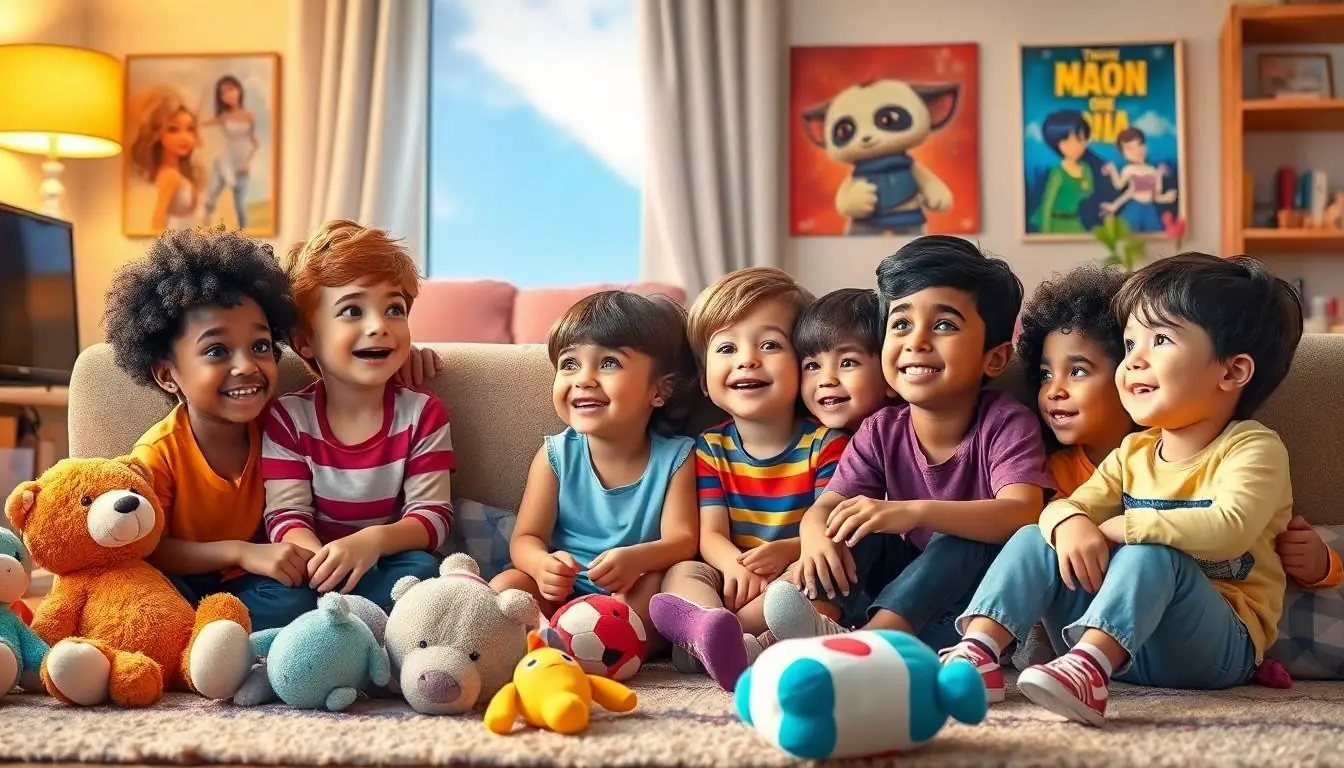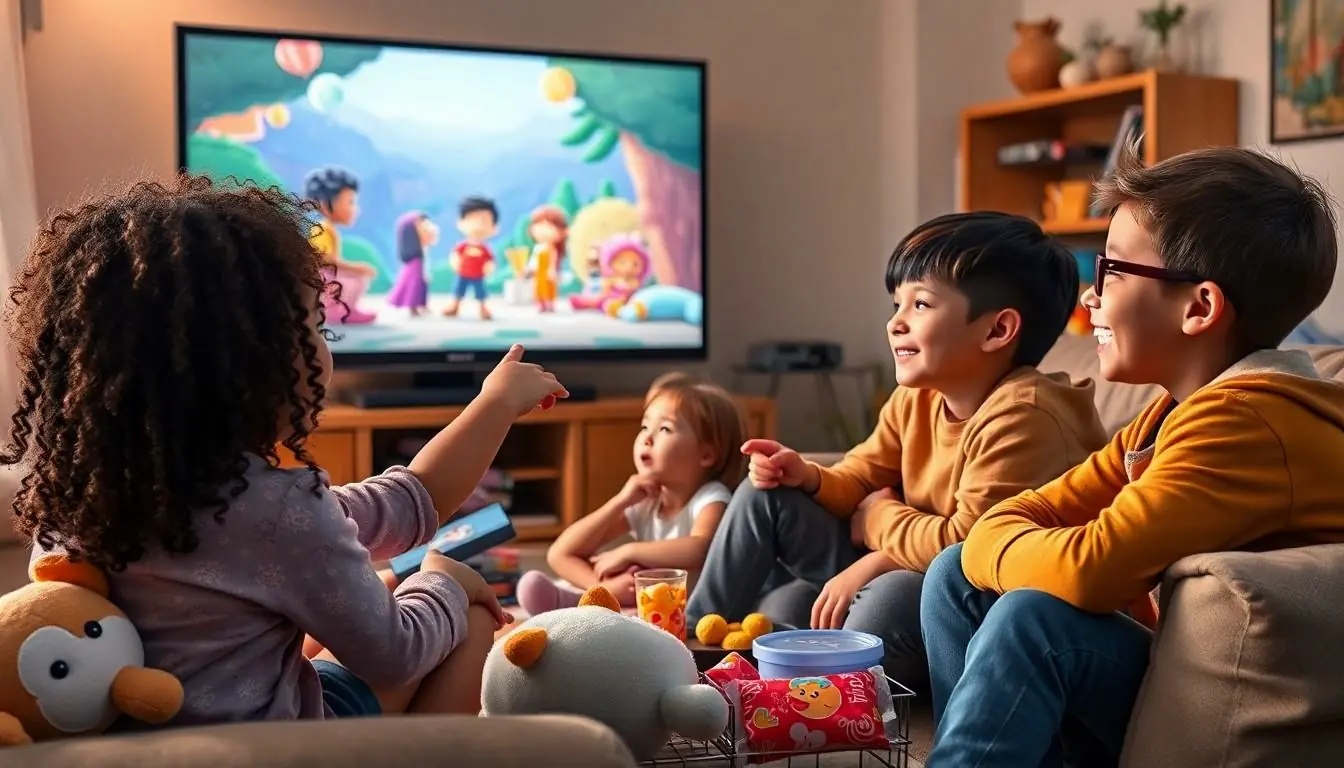Mental health isn’t just an adult concern; kids face their own emotional roller coasters too. Luckily, movies can be a fantastic tool to help them navigate their feelings while having a good laugh. Picture this: a group of animated characters tackling anxiety, depression, and friendship challenges, all while delivering punchlines that’ll leave kids giggling and thinking.
Table of Contents
ToggleImportance Of Mental Health Movies For Kids
Mental health movies for kids play a vital role in fostering emotional understanding. They offer relatable situations that resonate with children’s experiences.
Understanding Mental Health In Children
Children face unique emotional challenges, often struggling to articulate their feelings. Films that portray these struggles help kids recognize their emotions as valid. Characters in these movies exemplify a range of feelings, providing insights into anxiety, sadness, or friendship. This representation encourages children to express themselves more freely. Emotional literacy grows when kids observe characters navigating complex emotions successfully.
Benefits Of Movies As Educational Tools
Movies serve as powerful educational tools in several ways. Visual storytelling captures attention and makes learning engaging. Kids find it easier to connect with animated characters, leading to discussions about emotions. Through problem-solving scenarios, children gain practical coping strategies. Parents can initiate conversations by referencing movie themes, enhancing understanding and emotional processing. Additionally, these films can reduce stigma around mental health issues by normalizing discussions.
Recommended Mental Health Movies For Kids

Movies serve as a valuable resource for kids to understand their emotions. Here are some recommendations across different genres.
Animated Films
Animation provides a unique avenue for emotional exploration. Inside Out explores feelings like joy, sadness, and anger through relatable characters. Finding Nemo showcases themes of anxiety and parental love, illustrating coping strategies for kids. Coco emphasizes the importance of family and memory, presenting grief in a gentle, engaging manner. Each film encourages children to articulate their feelings while promoting empathy.
Live Action Films
Live action films also address mental health topics effectively. A Monster Calls deals with grief and loss, using fantastical elements to soften the impact of its themes. Bridge to Terabithia explores friendship and emotional resilience, highlighting the journey of coping with tragedy. The Pursuit of Happyness presents perseverance and hope through real-life struggles, making it relatable for children. These films encourage discussions about complex emotions in a realistic context.
Themes And Lessons In Mental Health Movies
Mental health movies for kids highlight several important themes and lessons. These films create spaces for understanding emotions and coping mechanisms.
Coping With Anxiety
Characters in films like Inside Out and Finding Nemo face anxiety directly. These movies present challenges that resonate with children’s experiences, helping them recognize their own feelings. Coping strategies emerge organically from characters’ journeys, showcasing techniques like mindfulness and problem-solving. Viewers gain insight into how to express their fears while seeing that they aren’t alone. Through humor and relatable narratives, anxiety becomes a topic that sparks conversations. Engaging animations and vivid storytelling make these lessons digestible for young audiences.
Building Resilience
Building resilience is a key theme in various mental health movies. Films such as A Monster Calls and Bridge to Terabithia illustrate characters confronting adversity and developing inner strength. Each story emphasizes the importance of perseverance and adapting to life’s challenges. Children learn that setbacks can lead to personal growth and deeper connections with others. Characters often model support systems, demonstrating the value of friendship and community. By witnessing these journeys, young viewers grasp resilience as an essential life skill. This portrayal empowers kids to approach their difficulties with optimism and courage.
How To Introduce These Movies To Kids
Introducing mental health movies to kids requires a thoughtful approach. Selecting the right films can spark important conversations and foster emotional understanding.
Discussion Tips For Parents
Start discussions before watching the movie to set expectations. Ask questions like, “What do you think this movie is about?” Taking time during and after the film encourages children to express their thoughts and feelings. Invite them to share specific moments that resonated with them. Relating the film’s themes to their own experiences builds connections. Be open to exploring complex emotions together. Acknowledge their feelings and reinforce that all emotions are valid. Listening carefully shows children they are supported and understood.
Creating A Safe Viewing Environment
Establish a comfortable atmosphere for watching the movie. Select a familiar space where kids feel secure. Ensure the viewing time fits their mood and energy levels. Being attentive to their reactions during the film helps gauge their comfort. Pause the movie when needed, allowing time for questions or reflections. Emphasizing the film’s messages promotes open discussions about emotions. Reassure them that it’s okay to feel differently about the characters’ experiences. Encouraging dialogue reinforces a safe space for expressing feelings and reinforces emotional learning.
Mental health movies for kids serve as essential tools for emotional growth and understanding. They provide relatable narratives that help children navigate their feelings and recognize the importance of mental well-being. By introducing these films into their lives, parents can foster open conversations about emotions and create a supportive environment for expression.
Through engaging storytelling and relatable characters, these movies empower kids to confront their challenges with resilience and optimism. They not only normalize discussions about mental health but also equip children with coping strategies they can use in real-life situations. Ultimately, integrating mental health films into family viewing can significantly impact a child’s emotional development and overall well-being.



